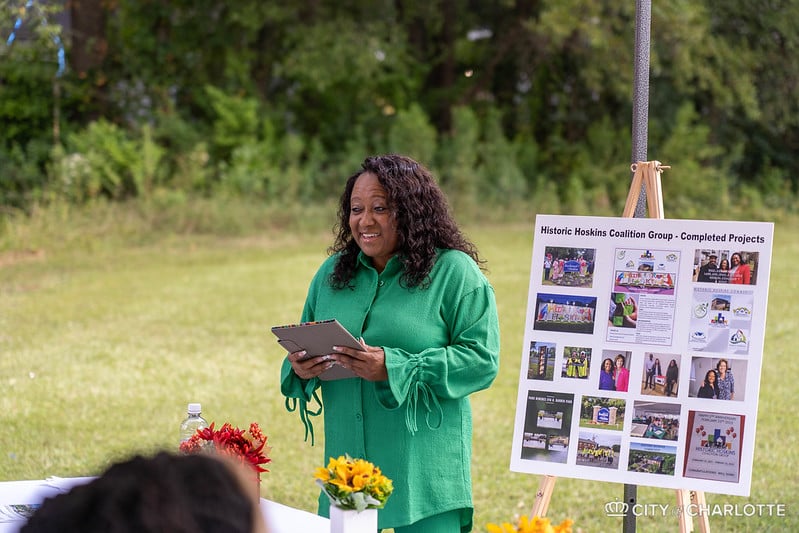CHARLOTTE, N.C. (CN) — When Beverly Mackins learned earlier this year that her landlord was selling the house she’s rented for the last seven years in the Hoskins neighborhood, she naturally was worried.
The “first thought I had was ‘Lord, where am I going to move to?’” the Charlotte resident told Courthouse News during the second annual Historic Hoskins Parade and Festival this month. “It’s so hard out here now to get a place.”
Over the last three years or so, Mackins and others in Hoskins had noticed what they describe as some troubling trends in their community. Outside entities were buying up homes, renovating them and pricing out locals, residents and community leaders say.
But when Mackins’ house did sell, the sale turned out to be an opportunity for her. West Side Community Land Trust, an organization working to preserve affordable housing in the city, this year purchased 32 homes in Hoskins, including hers. The organization has pledged to keep the homes affordable, so Mackins will get to stay and the house will see much-needed renovations.
Charlotte is often cited as one of America’s fastest-growing cities. Like in many cities across the country, all that growth has put a strain on housing stock, raising housing prices and leaving longtime residents worried about getting pushed out.
Those fears are particularly present in Hoskins, a former mill town and majority Black neighborhood near Uptown Charlotte. Between its central location and relatively high rates of poverty, Hoskins is uniquely vulnerable to gentrification. City data lists the two parcels that make up the Hoskins community as being vulnerable to displacement.
Now, leaders in Charlotte hope community ownership will help slow displacement in this iconic neighborhood. This unique arrangement, announced in early September, will help keep those Hoskins homes permanently affordable, while also providing long-neglected renovations and a chance for tenants to purchase the homes themselves someday.
The plan was made possible through a significant public investment. Mecklenburg County, home to Charlotte, transferred more than $6 million in federal pandemic relief money to the Land Trust — the Land Trust’s largest public gift to date.
As other communities across the country grapple with gentrification, the events in Hoskins offer a blueprint for keeping longtime residents in place. Here, residents banded together to help keep people in their homes, finding innovative new ways to grapple with the specter of gentrification and a dearth of affordable housing.
It’s a happier story than the usual one about gentrification, in which rising property values lead to eviction and uprooted communities. The outcome is in large part thanks to Hoskins community leaders, who first raised the alarm about a single landlord who was preparing to sell dozens of properties in the neighborhood.

A concerned neighborhood
One of those who raised the alarm was Beverly Knox Davis. Founder and president of the local Historic Hoskins Coalition Group and the nonprofit Brighter Day Ministries, she has lived in the Hoskins neighborhood since she was 5 years old.
Davis says Hoskins has always struggled to get the attention of city and county leaders. She’s experienced it herself as she’s tried to get basic services for the community. She says she has to make endless calls to accomplish even small tasks, from fixing a leak on the sidewalk to getting approval for a block party.
Adding to the sense of neglect, many of the homes in Hoskins are in dire need of renovations. “Everything that I recall as a 5-year-old to now, it pretty much looks the same,” Davis, now 54, told Courthouse News in a phone interview this month.









